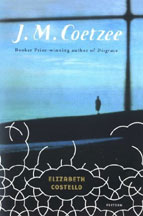November
2003
A
Suffering Thing
Book Review by Martin Rowe
|
|
|
 |
Elizabeth Costello by J. M. Coetzee
(New York: Viking Penguin, October 2003). $21.95 hardcover. 224 pages.
The most recent vegetarian writer (after George Bernard Shaw and Isaac
Bashevis Singer) to win the Nobel Prize for Literature is J. M. Coetzee—a
South African–born and naturalized Australian whose uncompromising
vision of South Africa both during and after Apartheid and whose lean,
beautifully composed novels, such as Waiting for the Barbarians
(1980) and The Life and Times of Michael K (1983), capture
in visceral, immediate detail what legacy violence leaves on the defenseless.
Coetzee’s advocacy for vegetarianism and animals is indirect and
freighted with irony. The main protagonist of Disgrace (1999)
dispatches euthanized dogs in an animal shelter; in his essay “Meat,”
Coetzee writes about traveling throughout the U.S. confronting a meat-oriented
world that attracts and repels him. Now we have Elizabeth Costello,
which, apart from the final two chapters, is a collection of previously
published essays/short stories that feature the eponymous heroine—a
sixty-something, Australian novelist whose most famous work, The
House on Eccles Street, depicts Molly Bloom, the cuckolding and
affirming wife of Leopold (the hero of James Joyce’s Ulysses).
Two of the chapters of Elizabeth Costello come from Coetzee’s
The Lives of Animals (1999), which consisted of two lectures
he delivered at the Center for Human Values at Princeton University.
These chapters take the form of lectures delivered by Elizabeth Costello
at fictional Appleton College in Waltham, Massachusetts. In the lectures,
Costello—to the bemusement of her son (who teaches there), the
revulsion of her daughter-in-law, and the horror of some of the attendees—talks
about the rights of animals in terms of the Holocaust and proves to
be an irritable, unforceful arguer, whose lectures leave people baffled,
upset, and (in her own case) exhausted. As Costello’s son drives
her to the airport, she reflects on the fact that, though the people
she meets are kind and the scenery they pass through seems benign enough,
her knowledge of the slaughterhouses hidden away is an almost unsupportable
burden: “It’s that I no longer know where I am,” she
tells her son. “I seem to move perfectly easily among people,
to have perfectly normal relations with them. Is it possible, I ask
myself, that all of them are participants in a crime of stupefying proportions?
Am I fantasizing it all? I must be mad! Yet every day I see the evidences.
The very people I suspect produce the evidence, exhibit it, offer it
to me. Corpses. Fragments of corpses that they have bought for money.”
When I first read The Lives of Animals, I felt that I immediately
understood Elizabeth Costello. Tired of carrying around the awareness
of that suffering, worn out from the philosophically “rigorous”
but emotionally empty justifications for animal (ab)use offered by the
well-meaning and the “sensible” people who surround her,
herself a diminishing shadow of an authentic self that wants to rage
against the destruction of life and the willful ignorance we cloak ourselves
with, Costello could be any animal activist who asks, like T. S. Eliot’s
equally cantankerous and disreputable Gerontion, “After such knowledge,
what forgiveness?” Coetzee’s delicious ironies—how
Costello both reflects and deflects attention toward and away from his
own positions; how Costello’s unlikeability, ineffectuality as
an advocate, and dryness as a speaker serve both to disarm and complicate
the critic’s reaction to Coetzee as a writer—ramify long
after Lives ended.
Elizabeth Costello consists of a series of lectures that this
famous novelist—as dry and reticent as Molly Bloom is vivacious
and verbose—is obliged to give on, among other things, realism
in the novel, African literature, and the problem of evil. Costello’s
heart is not in it; she agonizes about saying something new or relevant
or even vaguely interesting, but mostly feels bored, enervated, and
lost. She is shocked by cruelty and violence, and feels there is an
obligation to be truthful in confronting both; but she is also squeamish,
disaffected, and above all tired at having to defend her work, answer
stupid and meaningless questions, and act like a performing seal (her
son’s observation about her) at event after event. Elizabeth
Costello, more a cluster of vignettes than anything else, ends
with the aging author at a holding station before death, called to justify
her half-hearted attempts to define a belief before a Kafkaesque panel
of judges.
Coetzee’s writing is typically spare and his worldview unsparing:
moments of connection—erotic, familial, interspecies, literary—are
rare and laden with their inscrutability and impermanence. It would
be easy to believe that Coetzee is simply making morose fun of his own
trudging around the world as a famous author, called to make pronouncements
and magisterial judgments when all he has are doubts and feelings that
he manages to wrestle into characters who try their best (or sometimes
less than their best) to make their way in the world. But Coetzee is
too subtle an ironist and too deep a humanist simply to let the ornery,
confused, and tired feminist novelist Elizabeth Costello be the persona
he can use to deflect attention from his true feelings about how cruelly
we treat animals, or how compromised African literature is, or how lust
is so much simpler than love. Coetzee is always Costello and yet never
her—a glimpse into what the writer and perhaps the (animal) activist
always threatens to become: weighed down by what he/she knows, trying
to understand how it could happen, and struggling to communicate his/her
feelings for, as Eliot (again) once said in “Preludes:”
“The notion of some infinitely gentle/Infinitely suffering thing.”
Martin Rowe is the author of Nicaea:
A Book of Correspondences, and editor of The
Way of Compassion: Vegetarianism, Environmentalism, Animal Advocacy,
and Social Justice. He lives in Brooklyn, New York.

